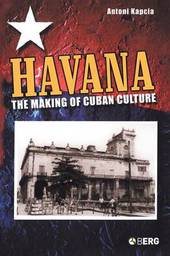
|
Havana: The Making of Cuban Culture
Paperback / softback
Main Details
| Title |
Havana: The Making of Cuban Culture
|
| Authors and Contributors |
By (author) Antoni Kapcia
|
| Physical Properties |
| Format:Paperback / softback | | Pages:256 | | Dimensions(mm): Height 234,Width 156 |
|
| Category/Genre | Places and peoples - pictorial works |
|---|
| ISBN/Barcode |
9781859738375
|
| Classifications | Dewey:306.09729123 |
|---|
| Audience | | General | | Tertiary Education (US: College) | |
|---|
| Illustrations |
20 b&w illustrations, bibliography, index
|
|
Publishing Details |
| Publisher |
Bloomsbury Publishing PLC
|
| Imprint |
Berg Publishers
|
| Publication Date |
1 July 2005 |
| Publication Country |
United Kingdom
|
Description
Fat cigars, big cars, dirty money, vibrant music, intellectual ferment. Havana, since its creation in 1535, has long offered a unique, bewildering mix of the backward and the hip, the seedy and the sophisticated. In many respects, it shares the characteristics of other colonial or post-colonial cities of the Caribbean and Latin America. But at the same time, Havana created its own niche both as an international city and a dynamic national capital. Despite Cuba's fluctuating fortunes, Havana has always managed to thrive and develop its own unique character as an urban, social, economic, cultural and political site.Havana offers a sweeping account of the city and its cultural development, focusing especially on the last two centuries and on the role played by the city's cultural communities in the search for national identity. The author introduces us to a marginal city with roots in the sixteenth century, taking us through the periods when it was a sugar boomtown, pulled between empires, a decadent metropolis, a site of both cultural revolution and relative stagnation during the development of the Revolution to its revival in the 1990s. He looks at the often creative tensions between external influences (especially Spain, France and the United States) and indigenous cultural pressures. Areas covered include architecture, literature, music, dance, cinema and the press.Cosmopolitan playground and nationalist vanguard, Havana has developed its own style while at the same time both reflecting and directing the complicated politics of the whole of Cuba. This book offers a concise introduction to one of the most intriguing cities of the twenty-first century.
Author Biography
Antoni Kapcia is Professor of Latin American History at the University of Nottingham and the author of Cuba: Island of Dreams (Berg Publishers, 2000).
Reviews'This unique analysis of Cuba's search for a national identity is unrivalled for its understanding of the interaction between elites, culminating in a lucid account of the problems of revolutionary mass culture, brilliantly evoking the uniqueness of Havana as a symbol for one of the world's most vibrant and creative nations.' Alistair Hennessy, retired Professor of History and Director for Centre of Caribbean Studies, Warwick University 'In his magisterial account of five hundred years of cultural history, Tony Kapcia captures the paradoxical contrasts and ironies of this great Atlantic port, once the gateway to the Indies, the mainstay of the Spanish silver trade and the bastion of the Imperial fleet since the seventeenth century. He explains how Havana, a city of 'fusion and confusion', harbour to Spanish galleons, slave ships, Russian tankers and cruise liners alike, became the melting pot of African and Spanish cultures, music, dance and art and how it came to symbolize Cuban national independence in the face of great adversity. This is an engrossing book by one of Britain's most distinguished Cubanists, a must for those keen to know more about the capital of the island known as 'Pearl of the Antilles', one of the most exciting places on earth.' Catherine Davies, Professor of Hispanic and Latin American Studies, University of Nottingham, author of 'A Place in the Sun? Women Writers in Twentieth-century Cuba' (Zed, 1997). 'Kapcia's cultural history of Havana is engaging, lively and thought-provoking. Issues of identity, history and culture are explored with gusto. Kapcia is a concise, entertaining, knowledgeable guide, who takes the reader on a compelling historical tour of a complex and fascinating city.' Dr. William M. Fowler, Department of Spanish, University of St Andrews 'Tony Kapcia's encyclopaedic knowledge and natural sympathy for the varied strands of Cuban culture combine here to create a riveting and original explanation of Havana's emergence as the most vibrant city in the Americas. He shows how the interaction of politics and culture in the revolutionary period, coupled with the harnessing of cultural trends from Europe, the United States, and black Africa, have created a unique blend of modernity and heritage, enabling the citizens of Havana to remake both the physical and spiritual dimensions of their city.' Richard Gott, author of 'Cuba: A New History' (Yale, 2004) 'Kapcia's encyclopaedic knowledge provides a kaleidoscope that is truly impressive and eminently readable.' Geoff Bottoms, Morning Star 'Kapacia paints a broad canvas with his gift for words and backs it up with excellent glossaries of abbreviations and Spanish terms, a comprehensive bibliography and extensive index.' Geoff Bottoms, Morning Star 'Touching on such areas as architecture, literature, music, visual arts, and the press, Kapcia's Havana is an academic guidebook to the history and culture of this fascinating and singular city.' British Bulletin of Publications (No. 113)
|